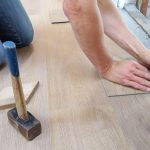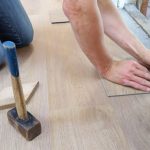What factors affect the lifespan of epoxy floors, Building Design Tips, Online Advice
What factors affect Epoxy Floors Lifespan
27 Apr 2021
What factors affect the lifespan of epoxy floors guide
Without the proper finish, the floor of any premises will present a dull and lusterless look. Epoxy floor paint will help your floor look much more shiny, luxurious, and hygienic. Epoxy floors are a convenient option for both commercial and residential owners to ensure long-lasting flooring. A major concern for installing epoxy floors is durability and owners want to know are epoxy floors worth the investment?
In this article, we provide information on what is epoxy flooring, how it should be installed, and when they need to be replaced. That’s right, they do need to be replaced or restored at some point in time, this is not a permanent solution.
Distinguishing Between Epoxy Floor Paint & Epoxy Floor Coating?
People often get confused between the two terms, epoxy floor paint and epoxy coating, and use them interchangeably. The fact remains that epoxy floor paint is NOT epoxy coating. Epoxy floor paint is a form of paint blended in with epoxy resin also collectively known as 1-part epoxy paint. The epoxy in the paint plays the role of providing durability and better adhesion but it is NOT an epoxy coating.
Epoxy coating is an epoxy resin that has been blended with a polyamine hardener and properly mixed before being applied to the surface. Once the epoxy resin and polyamine hardener mixture are ready, there is a limited amount of time to apply the mixture. The resin is tinted and it provides color to the mixture, which would otherwise be a clear coating. Epoxy coatings have a curing time rather than a drying time which is used for paint.
What Does The Percentage Solids Rating On A Product Mean?
The quality and the number of solids within the mixture determine the amount of resistance and durability of the final epoxy coating. The thickness of the epoxy depends on the volume of solids and this directly influences the ease of application. This is displayed on the product as a percentage. For example, a product might have a 50% solids or a 100% solids epoxy rating on the product.
A product with 100% solids epoxy rating means that 100% of the product will remain on the floor after the setting time is complete. Similarly, a product with a 50% solids rating means that 50% of the product will remain on the floor after the curing time is complete. This is because the carrier agents, more commonly known as water or solvents, evaporate or dissipate from the product during the curing time, in the product with a lower percentage solids rating. The final epoxy coating with a higher solids rating is a durable multi-layered surface that is much more resistant to impact.
To make matters clearer a 100% solids rating product, when applied with a roller with a wet film thickness (WFT) of 12 mils, will have a dry film thickness (DFT) of 12 mils after the curing time. Similarly, a 50% solids rating product, when applied with a roller with a wet film thickness of 12 mils, will have a dry film thickness of 6 mils after the curing time. The product with a higher solids rating will be more difficult to apply because of its dense viscosity and shorter time to apply. The product with a lower solids rating will be easier to apply and it will not be as expensive as the product with a higher solids rating.
What Is Hot Tire Pick-Up Resistance?
Epoxy coating with a high solids rating has a clear advantage when applied to a car garage floor in consideration to “hot tire pickup resistance”. Tires get hot after making long trips on the road. There is a contingency that cheap epoxy paint with a low solids rating will come off of the substrate and stick to the tires when you drive in after a long drive. A car garage floor with an epoxy coating with a high solids rating will not delaminate from the substrate or stick to the tires once the curation process is complete because it has hot tire pickup resistance.
Using an epoxy coating with a high solids rating and applying a coat with a thickness of 20-25 mils ensures a much more dependable and durable solution that can last anywhere from 8 to 10 years. The epoxy coating with a high solids rating will incur savings by NOT needing to be replaced every few years.
The lower solids rating product will be cheaper and possibly a DIY project but it will turn out to be an expensive decision in the long run because it will need to be replaced every few years. The epoxy coating with a high solids rating will be expensive initially, but it will help incur savings in the long run by lasting much longer with proper regular maintenance.
Factors Directly Influencing Life Expectancy Of Epoxy Floors & Proper Maintenance
The durability and life expectancy of an epoxy floor depend on many different factors. One of the most important things is to have a professional installation because the professional installer will provide a warranty for the installation. Once an epoxy floor is installed professionally it can last up to 30 years in a residential premises and anywhere between 5 to years in a commercial or industrial premises. These are the average lifespans of the materials but there are other factors to consider.
The strength of the concrete underneath the epoxy, thickness of the epoxy, quality of topcoat, exposure to UV light, and the average footfall play a role in affecting the longevity of the epoxy. To preserve the longevity of the epoxy clean the surface with a mixture of ½ cup ammonia with 1 gallon of hot water. The epoxy coating should not be cleaned with bleach, chemical, or acidic cleaners. Using these products will reduce the lifespan of the epoxy surface.
To increase the lifespan of the epoxy coating, avoid dragging heavy objects on the floor that can cause permanent damage to the floor. Avoid dropping burning coal or any other excessively hot objects onto the floor as this can damage the epoxy coating if it has not been treated properly. Prolonged exposure to dust and dirt will have a negative impact on the overall lifespan of the product. Consider dusting the floors with a dust mop daily and using a wet mop with the ammonia solution at least once a week to extend the lifespan of the product.
Comments on this What Factors Affect The Lifespan Of Epoxy Floors? article are welcome.
Floors
Flooring Posts
9 Reasons to Use Tiles for Interior Design
Solid wood flooring for your home
Flooring that are Good for Winnipeg Homes
How To Protect Floors, Walls and Carpets When Moving
Buildings
Residential Architecture Design
Comments / photos for the What Factors Affect The Lifespan Of Epoxy Floors? page welcome






